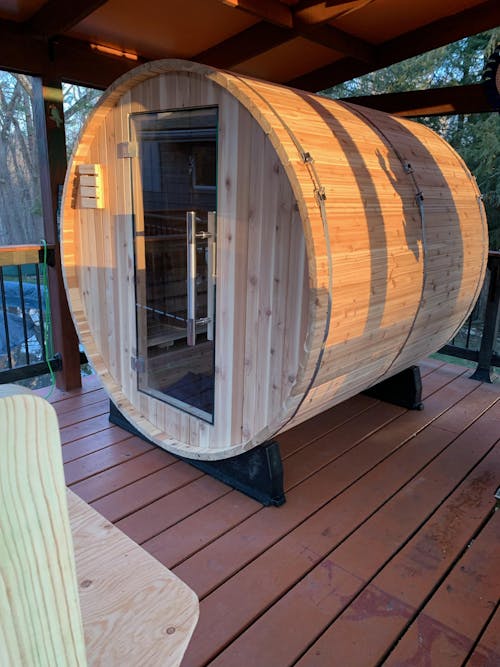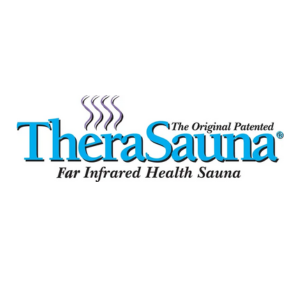THE POWER OF SCENT: EXPLORING THE BENEFITS OF SAUNA AROMATHERAPY
It's no secret that daily stressors, such as work deadlines, traffic jams, or relationship problems, can take a heavy toll on your mental and physical well-being.
If you want to unwind and relax after a long day, consider the transformative power of sauna aromatherapy — a delightful fusion of sauna bathing and aromatherapy.
When combined with the soothing heat of a sauna, Healthline notes that essential oils can help reduce stress, improve skin conditions, treat common colds, and even relieve pain.
But what essential oils can you use to help maximize the benefits of your sauna session, and how can you effectively harness their therapeutic properties?
Keep reading to learn about the several benefits of sauna aromatherapy and how to create the ultimate relaxation sanctuary.
Understanding the Science Behind Aromatherapy
The National Association for Holistic Aromatherapy defines aromatherapy as a holistic healing practice that uses natural plant extracts, specifically essential oils, to enhance your physical, mental, and spiritual well-being.
The Importance of Scent
Research shows that your sense of smell is closely linked to the limbic system, the part of the brain responsible for emotions, memories, and hormone balance.
As you inhale the aroma of essential oils, the molecules interact with your olfactory receptors, sending signals to your limbic system. This connection explains why certain scents can evoke powerful emotions and memories and influence our mood and stress levels.
Essential Oil Chemistry
Essential oils comprise various chemical compounds that contribute to their unique therapeutic properties. Studies show that essential oils like citrus and lavender contain compounds with anti-inflammatory, antimicrobial, or analgesic effects.
These compounds can be absorbed through the skin or inhaled to provide relief from a variety of ailments. Others contain ingredients that promote mental well-being, reducing stress and anxiety.

Benefits of Sauna Aromatherapy
While essential oils offer myriad health benefits on their own, when combined with sauna therapy, these two practices synergize to provide many benefits beyond the traditional sauna experience.
Following are some of the benefits of sauna aromatherapy:
Stress and Anxiety Relief
According to the Cleveland Clinic, when you're stressed, your body activates its fight-or-flight response, which releases cortisol — your body's stress hormone — that prepares you for action.
WebMD explains that this elevated cortisol level can negatively impact your physical and emotional health, leading to sleep disturbances, weakened immune function, and increased risk of chronic diseases.
Sauna aromatherapy offers a holistic approach to help alleviate anxiety and reduce stress. Studies show that as your body temperature ramps up, your cortisol levels drop, putting you into a relaxed state. This helps you de-stress, soothe tense muscles, and calm your mind.
Essential oils such as ylang-ylang, frankincense, and peppermint are scientifically proven to have a calming effect on the body and mind. When combined with a sauna bath, the warmth helps disperse the aromatic molecules, resulting in quicker inhalation.
As you breathe in these calming scents, they tend to have a direct effect on your nervous system, helping you relax and unwind.
Improved Respiratory Health
Studies show that air pollutants like smoke, dust, and pollen can severely irritate your bronchial tubes, leading to coughing, wheezing, shortness of breath, asthma flare-ups, and respiratory illnesses such as tuberculosis, pneumonia, bronchitis, and even lung cancer.
Fortunately, sauna aromatherapy can help fight back against these harmful pollutants. The heat from a sauna is beneficial for respiration, as it can help loosen up the mucus in your lungs, removing irritants and making breathing easier.
As noted in several studies, essential oils like eucalyptus, peppermint, and menthol have decongestant properties that can further assist in clearing nasal and sinus congestion.
As you're exposed to the high temperature of a sauna, your breathing also gets deeper to help cool you off. Mayo Clinic notes that this makes your diaphragm expand and contract more rapidly, which can help improve your lung capacity, leading to better overall health and a lower risk of respiratory diseases like asthma.
Pain Relief
Medical News Today explains that heat therapy increases blood flow to the affected area, reducing inflammation, relaxing muscles, and promoting healing. Saunas, in particular, provide a controlled environment where the heat can be evenly distributed and maintained at a consistent temperature.
Using essential oils like lavender or eucalyptus during a sauna session act as a natural analgesic and sedative, potentially reducing pain and discomfort.
The heat from the sauna helps open your pores, allowing the essential oils to enter your bloodstream and the affected areas more rapidly.
Research shows that lavender and eucalyptus essential oils can help with neuropathic pain. So if you're experiencing tingling or numbness in your extremities, it may be worth considering adding essential oils to your sauna routine.
Mood Enhancement
You'll be glad to leave that with the help of sauna aromatherapy; you can keep your mood swings in check.
This is because the heat from a sauna dilates your blood vessels and increases blood circulation, improving your brain oxygenation. This has been shown to stimulate the production of endorphins in your body, aka the "feel good" hormones.
The Cleveland Clinic explains that endorphins can give you a natural high, making you feel happy and relaxed while promoting a more positive outlook.
Detoxification
Perhaps one of the most significant benefits of sauna aromatherapy is detoxification. Studies show the heat from a sauna (such as the Almost Heaven Audra) can open up your pores and increase perspiration, which can help eliminate toxins through sweat.
When combined with essential oils, the detoxification process can be further enhanced. Essential oils, such as lemon and lemongrass, are known for their detoxifying and cleansing properties. The National Association of Holistic Aromatherapy explains that they can help eliminate toxins, strengthen your immune system, and improve your skin by preventing skin conditions such as acne.

How to Use Essential Oils for Sauna Aromatherapy
There are multiple ways of using essential oils for sauna aromatherapy, including using an oil diffuser, a bucket and a ladle, and topical application.
If you choose to use essential oils, please use them only in your home sauna, as they may not be suitable for others in a public sauna.
Using an Oil Diffuser
If you plan to use an infrared sauna, you can use an oil diffuser like Health Mate Aroma Therapy Cup.
Ensure that the oil diffuser you select is designed for sauna use and can withstand the high temperatures and humidity levels typically in saunas. Look for diffusers specifically labeled as sauna-safe or heat-resistant.
Consider placing the diffuser in a safe and elevated position within the sauna to avoid direct contact with surfaces. Make sure that the diffuser is secure and stable to prevent any accidental spills or damage.

Using a Bucket and a Ladle
In traditional saunas like Dundalk Leisure Craft Knotty Cedar Barrel, you can use essential oils using a bucket and a ladle.
Start by adding a few drops of your preferred essential oil to a bucket of water and then pour the mixture onto the wooden surface to create steam.
Here's a step-by-step guide on how to do it properly:
-
Mix 4-6 drops of essential oil with 1 cup of water in a bucket. You can also use a carrier oil, such as coconut or jojoba, to dilute the essential oil.
-
Turn on the sauna and let it heat to your desired temperature. Most saunas operate between 150°F (65°C) and 195°F (90°C).
-
Once the sauna is heated, use a ladle to pour the diluted essential oil mixture onto the sauna rocks or wood surfaces.
The heat will release the aroma of the essential oils into the air, creating a soothing and relaxing environment.

Topical Application
When it comes to diluting essential oils for safe use on the skin, you can use a few methods and carrier oils.
A standard dilution ratio for general use on the body is 2-3% (2-3 drops of essential oil per teaspoon or 5mL of carrier oil). This ratio is considered safe for most adults. A few carrier oils you can use to dilute the essential oils are:
-
Jojoba oil: Suitable for most skin types, as it closely resembles the skin's natural sebum and is easily absorbed
-
Sweet almond oil: Nourishing and suitable for all skin types, including sensitive skin.
-
Coconut oil: Solid at room temperature but melts upon contact with the skin, leaving it moisturized.
-
Grapeseed oil: Light and easily absorbed, suitable for oily or acne-prone skin.
-
Avocado oil: Rich and nourishing, ideal for dry or mature skin.
Apply a moderate amount of diluted essential oil to your skin, focusing on pulse points or areas where you desire the benefits of the oil. Avoid excessive application, as the sauna's heat can intensify the aroma.
Perform a patch test before applying the diluted essential oil to a larger skin area. Apply a small amount of the diluted oil to a small skin patch, such as the inner forearm, and wait 24 hours to check for adverse reactions or sensitivities.

Precautions and Safety Tips
While essential oils offer numerous benefits, it is vital to use them cautiously to ensure your safety and well-being.
-
Use high-quality essential oils to ensure safety and optimal therapeutic benefits. Inferior quality oils may be diluted or adulterated, compromising their effectiveness and potentially causing harm.
-
Dilute properly: Most essential oils are highly concentrated and should be diluted before use. Always follow recommended dilution ratios and use a carrier oil (such as jojoba, almond, or coconut) to avoid skin irritation.
-
Perform a patch test: Before applying an essential oil topically, conduct a patch test on a small area of your skin to check for any adverse reactions or allergies.
-
Avoid direct contact with eyes and sensitive areas: Essential oils can irritate the eyes and sensitive areas of the skin. Take care to avoid direct contact with these areas. If accidental contact occurs, rinse with plenty of cool water.
-
Use caution during pregnancy and breastfeeding: Not all essential oils are safe for use during pregnancy or breastfeeding. Consult a healthcare professional to determine which oils are safe to use during these periods.
-
Store oils properly: Essential oils are sensitive to heat, light, and air. Store them in dark, glass bottles in a cool, dry place to maintain their potency and extend their shelf life.
-
Avoid using undiluted essential oils directly on the sauna rocks or heater, as this can be a potential fire hazard.
-
Clean any surface that has come into contact with the essential oils once your sauna session ends. This will help prevent any discoloration or damage to the wood.
Everyone reacts differently to essential oils, so it's important to listen to your body and adjust usage accordingly.
If you experience any adverse reactions or discomfort, discontinue use and seek medical advice. By following these precautions and safety tips, you can enjoy the benefits of essential oils while keeping yourself safe and protected.

Benefits of Sauna Aromatherapy: The Takeaway
Steam aromatherapy offers several benefits, from enhancing your mood to alleviating muscle pain, improving skin, and strengthening your immune system.
While the best essential oils for you may depend on your preferences, several options, such as lavender, eucalyptus, peppermint, and frankincense, are backed by several scientific studies and are highly recommended.
If you're interested in experiencing your sauna aromatherapy sessions at home, check out My Sauna World's collection of saunas and essential oils.
For more information or queries, feel free to contact us, and our friendly staff will gladly assist you.
SIGN UP. SAVE BIG.
Subscribe to be the first to know about our special monthly sauna sales, sent right to your inbox.

About the Author
Adam Fromson
Adam Fromson, co-founder of My Sauna World, loves saunas and their transformative health benefits. With years of experience exploring sauna culture and its impact on health and wellness, Adam is passionate about helping others discover the life-changing benefits of saunas for themselves.
Let customers speak for us
from 387 reviews
Good communication, easy delivery, easy set up, easy operation, great value. Recommended!

We ordered the 4 person barrel sauna and love it! We wanted a little extra space for the 2 of us/guests and it’s great. We could definitely fit 4 people in it if we needed. We use it every single day. It took about 10 weeks to get here because they build it specifically for the order. Putting the barrel together was fairly easy with 2 people. The electrical and the heater definitely required an electrician to install as we could have not done it alone.
We ordered the biggest heater (harvia spirit 8kw) and it heats up the sauna in about 15 mins inside our 40-50° garage. Overall this style of sauna is hotter and you sweat a lot faster than in an infrared sauna. I truly 10/10 recommend!
Pic is of us in the middle of building it.

Took me about 6 hours over 2 evenings to assemble almost all by myself. Had a pro run a new circuit from my panel. Very well made and assembly was straightforward. Heater is well sized and reaches operating temperature in under 30 minutes.

Great sauna very easy to assemble

The salt panel was a great addition to our Madison Sauna. It has excellent grain which is accented by the amazing color lights that glow through the panel. Also when you hit the rocks with a splash of water you can feel the heat bounce off the panel. Great addition if you are considering this option.

We can say enough about Sauna World there customer support is great! Our Pinnacle Sauna from Almost Heaven is epic.

The finish and quality is outstanding and it was quick and easy to assemble.

We are thrilled with our mini pod!! It came well shipped and our friend assembled it in 11 hours! Wow! We cannot wait to get healthy and sauna it up!

Beautiful sauna!!! Much easier than I expected to assemble, took a total of 4 hours. Can't wait to get warm by the pool on those cool evenings. Customer service was excellent..

Purchased a 2 person Almost Heaven barrel sauna and were delighted with the product. The order process was quick and easy, the sauna arrived on-time, installation was simple, following the provided instructions, and the sauna is extremely high quality. We’ve used it daily for over 2 weeks and quite frankly I don’t know how we lived without it. If I had it to do over again I wouldn’t change a thing... except maybe purchasing a 4 person model to easier share with friends!

Great Customer Service and a breeze to put together.Excellent shipping and the Sauna is top notch, couldn’t be happier






























